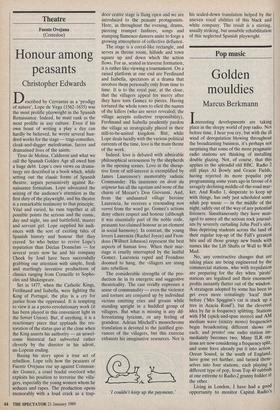Theatre
Fuente Ovejuna (Cottesloe)
Honour among peasants
Christopher Edwards
Described by Cervantes as a 'prodigy of nature', Lope de Vega (1562-1635) was the most prolific playwright in the Spanish Renaissance. Indeed, he must rank as the most prolific in any culture. Even if his own boast of writing a play a day can hardly be believed, he wrote several hun- dred works for the stage — tragi-comedies, cloak-and-dagger melodramas, farces and dramatised lives of the saints.
Tirso de Molina, Calderon and what we call the Spanish Golden Age all owed him a huge debt. Lope's own views on drama- turgy are described in a book which, while setting out the classic forms of Spanish theatre, argues persuasively against Re- naissance formalism. Lope advocated the seizing of the audience's attention as the first duty of the playwright, and his theatre is a remarkable testimony to that principle. Vital and varied, he runs together at all possible points the serious and the comic, day and night, inn and battlefield, master and servant girl. Lope supplied his audi- ences with the sort of exciting tales of Spanish history and honour that they craved. So who better to revive Lope's reputation than Declan Donnelan — for several years now he and his company Cheek by Jowl have been successfully grabbing our attention with simple, fresh and startlingly inventive productions of classics ranging from Corneille to Sopho- cies and Shakespeare.
Set in 1477, when the Catholic Kings, Ferdinand and Isabella, were fighting the King of Portugal, the play is a cry for justice from the oppressed. It is tempting to view it as a proto-revolutionary work (it has been played in this convenient light in the Soviet Union). But, if anything, it is a reactionary piece that applauds the res- toration of the status quo at the close when the King asserts his authority — an unwel- come historical fact subverted rather cleverly by the director in his adroit, un-Lopean ending.
Basing his story upon a true act of rebellion, Lope tells how the peasants of Fuente Ovejuna rise up against Comman- der Gomez, a cruel feudal overlord who exploits his position to terrorise the villa- gers, especially the young women whom he seduces and rapes. The production opens memorably with a loud crack as a trap- door centre stage is flung open and we are introduced to the peasant protagonists. Here, as throughout the evening, drums, piercing trumpet fanfares, songs and stamping flamenco dancers unite to forge a growing atmosphere of collective defiance.
The stage is a corral-like rectangle, and serves as throne room, hillside and town square up and down which the action flows. For us, seated in traverse formation, it is rather like viewing a tournament. On a raised platform at one end are Ferdinand and Isabella, spectators at a drama that involves them personally only from time to time. It is to the royal pair, at the close, that the villagers appeal for mercy after they have torn Gomez to pieces. Having tortured the whole town to elicit the names of the killers (who are never revealed; the village accepts collective responsibility), Ferdinand and Isabella prudently pardon the village so strategically placed in their still-to-be-united kingdom. But, while Lope deals lucidly with the various political currents of the time, love is the main theme of the work.
Indeed, love is debated with admirable philosophical seriousness by the shepherds in the opening scenes. Love in the disrup- tive form of self-interest is exemplified by James Laurenson's memorably sadistic Commander. His insistence on droit du seigneur has all the egotism and none of the charm of Mozart's Don Giovanni. And, from the undaunted village heroine Laurencia, he receives a resounding non vorrei from the word go. Gomez's actions deny others respect and honour (although it was essentially part of the noble code, peasants too claimed honour as an element in social harmony). In contrast, the young lovers Laurencia (Rachel Joyce) and Fron- doso (Wilbert Johnson) represent the best aspects of human love. When their mar- riage is cruelly interrupted by the lustful Gomez, Laurencia raped and Frondoso doomed to hang, the villagers are stung into rebellion.
The considerable strengths of the pro- duction lie in its energetic and suggestive theatricality. The cast vividly expresses a sense of communality — even the violence and torture are conjured up by individual victims emitting cries and groans while standing upright in a huddled group of villagers. But what is missing is any dif- ferentiating lyricism, or any feeling of grandeur. Adrian Mitchell's monochrome translation is devoted to the justified grie- vances of the villagers, but this exercise exhausts his imaginative resources. Nor is 'I couldn't keep up the payments.' his scaled-down translation helped by the uneven vocal abilities of this black and white company. The result is a stirring, usually striking, but unsubtle rehabilitation of this neglected Spanish playwright.


























































 Previous page
Previous page